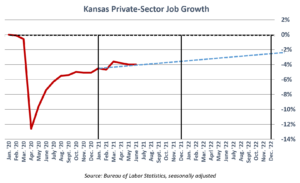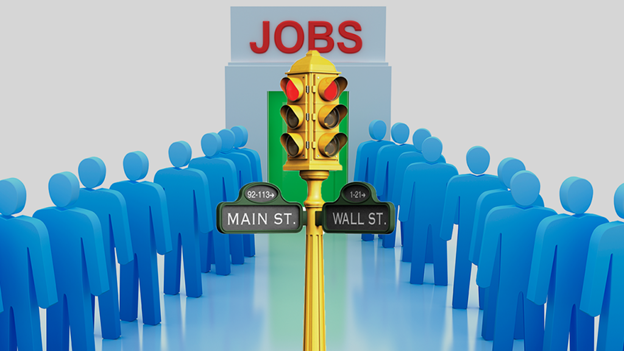4,000 private-sector jobs were lost in Kansas during the 2nd quarter of 2021, but 8,500 government jobs were added at the same time, according to the Bureau of Labor Statistics. Local units of government – mostly cities, counties, and school districts – added 6,000 jobs; state agencies and universities added 2,600, and federal jobs declined by 100.
While Kansas lost private-sector jobs, Missouri gained 6,400; Oklahoma added 1,500 private-sector jobs, Nebraska gained 400, and Colorado added 52,400. Over 1.4 million private-sector jobs were added nationwide.
Private-sector employment Kansas may not return to pre-COVID levels until late 2023 at if the pace since January continues.

The Professional and Business Services sector suffered the worst loss, down 2,000 jobs; employment in the Financial Services sector dropped by 1,100, Wholesale Trade fell by 600, Retail jobs were down by 400, and there were 400 fewer Construction jobs. Jobs were added in the Leisure & Hospitality and Manufacturing sectors.
Media continues covering up loss of private-sector jobs
Local media screamed bad economic news when a Republican was governor but they provide cover for Democrat Laura Kelly. Pick your search engine of choice and search “Brownback AND economy AND jobs” to see what comes up, then substitute Laura Kelly for Brownback and compare. It won’t take long.
The Wichita Eagle, for example, graciously reported a small decline in the increase of unemployment claims for May but hid the fact that private-sector jobs declined.
Imagine the headlines if, under a Republican governor, Johnson County lost $300 million in adjusted gross income from net declines in domestic migration, and the rest of the state lost more than $2 billion. That’s what happened between 2015 and 2019 according to IRS data (when sales taxes and income taxes were rapidly increasing), but only Kansas Policy Institute reported those unfortunate realities.
Local government property tax hikes under consideration
While individuals and businesses are struggling to recover, some local units of government are planning hefty property tax hikes.
The City of Topeka, for example, is considering more than a 10% increase. Others include Olathe (8.9%), Gardner (7.2%), and Andover (6.3%).
Many cities, counties and school districts haven’t announced their intentions on property tax changes but they must do so by July 20 under the new Truth in Taxation law. A few cities tell KPI researchers they may slightly reduce property taxes, including the cities of Salina and Chanute.
Kansas needs lower taxes, less government regulation
No government has ever taxed or spent citizens to prosperity, but that is exactly what Governor Kelly and her Commerce Secretary/Lt. Gov. David Toland continue to push. Kelly created her Tax Council to justify tax hikes if she gets a second term, and they dutifully obliged. Toland, whom Kelly is grooming to replace her someday, is of the same mind. His economic growth plan for Kansas is more of the same that put Kansas in a five-decade slump – subsidies for a few businesses, more government spending programs, and eventually, higher taxes to pay for it all.
The Tax Foundation recently credited subsidies (aka, handouts) for giving Kansas the worst effective tax rates in the nation on mature businesses.
The private-sector job market will continue to suffer until there is a change in direction from state and local government officials.





